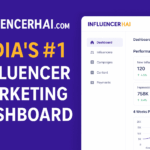Influencer marketing is one of the fastest-growing trends in digital marketing and has been for years now. It’s no surprise that more and more brands are looking to work with influencers, especially as we move into 2023.
If you’re interested in starting an influencer campaign or want to learn more about how it works, read on. We’ll cover everything from what influencers do (and don’t do).
How they can help your brand grow and engage with customers on social media platforms like Instagram or YouTube–plus show you how to get started with this exciting new form of digital advertising.
Influencer marketing is a powerful way to reach your audience. Influencers are people with a following on social media who can help you promote your brand. Celebrities, athletes, and regular people have an audience they can reach through influencer marketing.
Influencers can make or break brands because they can tell their stories directly from the heart and share what matters most. As such, you must choose someone who will be authentic when sharing content about your product or service—not just for advertising purposes but also because it shows authenticity in their life!
Brand strategy is the foundation of an influencer marketing campaign. It is important to have a clear goal in mind before starting a campaign and a clear brand identity and target audience.
A brand strategy should include understanding what you want your audience to see, hear and feel about you. It’s also important for brands to know how they want their fans to interact with them on social media platforms like Instagram or Twitter. This will help them decide which social media accounts are best suited for advertising campaigns based on their goals and objectives for each platform.
The first step to becoming an influencer is finding them. There are many ways to do this, but the most obvious way is through social media platforms like Twitter and Facebook. You can also look for them on YouTube or Instagram.
The next step is making sure that you’re finding the right people for your brand:
Campaign management is creating, developing, executing, and managing an influencer marketing campaign. It includes the following activities:
Engagement is the key to success as an influencer. It’s important to understand that engagement is not a one-time metric but a long-term strategy that can be measured in many ways.
I recently spoke with my friend, who told me he’s been thinking about how he should go about creating his next video series. He wants people to engage with it and share it on social media—but what exactly does this mean?
If you ask him directly: “How do we ensure our audience enjoys watching these videos?” The answer is something like, “We need more views! How do we get more views?” But what if, instead, we asked ourselves another question: What do people enjoy watching when they watch my channel frequently? And then following up by determining whether or not those activities align with our goals for this channel (and, therefore, whether or not this activity will likely be relevant).
As you begin your campaign, keeping track of the results is essential. You can use a variety of tools for this purpose. For example, create an online dashboard that keeps track of your social media posts, sales numbers, and other metrics related to your brand or product.
You can also use tools like Hootsuite or Buffer so that when someone clicks on one of your posts (or shares it), they appear in their list with links back to where they came from (so people know where they came from). This will allow you when measuring ROI – Return On Investment – because now there’s no guesswork involved!
Influencer marketing works with social media influencers to sell your product or service. Influencers have a large social media following and can help you spread the word about something you’re doing.
You can be an influencer or hire someone else to do it for you. The most common influencers are celebrities (like Kim Kardashian), experts (like Tony Robbins), and everyday users who have some following in their field—like moms on Instagram who share crafty recipes!
The goal of influencer marketing is to attract new customers and increase the number of followers for a brand’s page or product. The key to success is finding the right influencers with relevant content.
You’ll want to approach this process strategically to attract the audience you want without overspending or missing out on quality opportunities.
The top five skills you need to become an influencer are:
